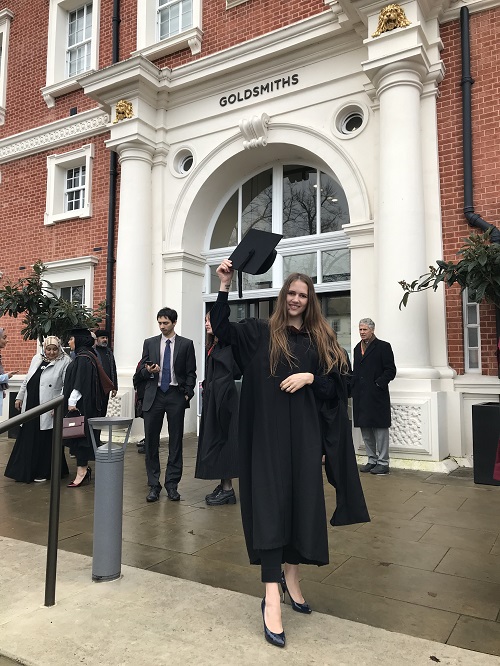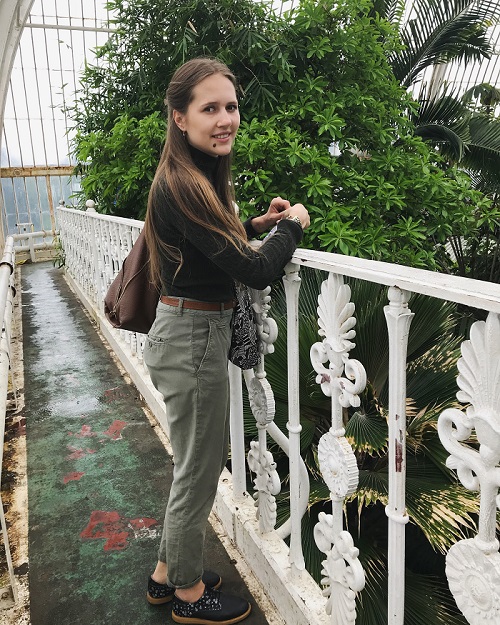Vera Uvarova, Graduate of Goldsmiths University of London about her experience of studies and further path
1. Hello, Vera! Tell us where you studied, what programme you graduated from and where are you now?
I studied in a master's degree at
Goldsmiths College (University of London) in
Arts Administration and Cultural Policy programme. I completed the course full-time in 1 year (2017/18). Now I live in London and work as a freelancer, mainly in the field of performing arts, but I also take great pleasure in participating in projects related to higher education in the creative industries. I am working with a Russian ballerina and recently I was invited to a modern dance project as a producer.
2. When you chose a university, what goals did you pursue from getting a higher education? If you can, name the 3 most important goals.
Probably, the most important goal was to gain knowledge about the cultural sphere of Great Britain and, if possible, to build personal connections with the art world. The second goal follows from the first. I wanted to find a job, but I'm probably the kind of person who should first learn, prepare, and then act. Of course, as you say, have fun was also a goal. I really like to study, I am in a good way an eternal student. If I find a suitable course, I will be happy to get another master's degree.
3. How did you choose the country, university, programme?
I chose the country before my master's degree, I moved to England a year before my admission. I wanted to find the right continuation of my Moscow education (I graduated from the Moscow Art Theater School with a degree in Theater Manager). My choice, for the most part, was based on a program that had to have a balance of theory and practice. My English family helped me a lot: many relatives studied or once taught at Goldsmiths and highly recommended it as a progressive educational institution specializing in creative areas. I visited their Open Day and realized that the place and the atmosphere are perfect for me. At the same time, I received advice on various programmes and made my choice. I must admit that the territorial factor also played an important role (I live 10 minutes from the college).
4. What was the most difficult thing in choosing a place of study and in applying?
As I have already said, the most difficult thing is to choose the right balanced programme. Personally, it was not easy for me to prepare an application and prepare for an interview, because I did not know what to expect. Perhaps I should have contacted an agency or talked to graduates, but I relied on myself.

5. Did you have the opportunity to get practical experience on the program?
Yes, my hopes for the course in this regard were justified. A big component of the program was practice in the organization of culture. Despite the fact that Goldsmiths helps with finding a place of practice, I found a theater company on my own and successfully worked with them for several months. There I gained a huge amount of knowledge and understood the subtleties of the work of non-profit organizations in the UK, including receiving grants from the Arts Council.
6. Highlight the 3 most important values that the chosen master's program has given you both as a professional and as an individual.
During the school year, I realized that my knowledge base was at a very good level. The teaching method and the atmosphere of the classes were conducive to expressing our own opinions, we had a lot of discussions among ourselves and with the teachers. A variety of lectures outside the college and invited guests greatly expanded the idea of the cultural offer of the UK. Probably, there are three main values that I can distinguish for myself: confidence in myself and my knowledge; getting rid of the fear of making a mistake or saying something that goes beyond a certain general opinion; I feel that any door in the art world is open for me, I just need to choose the one that is close to me at this stage and open it.
7. Did the university help you in finding a job? In what way?
Personally, I have not directly applied for help in finding a job, but I have received advice several times to improve my resume. This service helped me to organize my experience correctly and highlight key skills.
It so happened that after graduation, I continued to cooperate with the head of my program and faculty. Thanks to this, for several years I have been involved in organizing and conducting educational projects supported by the British Council. As far as I know, the few students who stayed in London after graduation successfully found a job. Some of them received contracts after completing an internship, while the college helped someone with obtaining a business visa. In general, if desired, it was possible to turn to a practical teacher for advice or recommendation.

8. Have you used the university's alumni network? What was the communication like?
Honestly, no. A nice bonus was the opportunity to continue using the library. I maintain contacts with students of my program, including professional ones. After graduation, I attended evening lectures at college and am waiting for the end of the pandemic to resume this practice.
9. What are the main difficulties you see for a Russian-speaking professional starting a career abroad? Try to identify 3-5 main difficulties. How can they be overcome, in your opinion?
I am sure that many will agree with me that this is the main difficulty – it is a different mentality. It took me some time to reveal the real meaning of some phrases and not be straightforward in Russian. The ability to support small talk, of course, can be distinguished as a separate art form. I would advise you to have an international circle of friends, not try to look for compatriots and study the local culture both in practice and through books.
If a professional does not have a work visa, then in some areas, such as art, it may be difficult to get sponsorship from an organization. In more "secure" areas, this is much easier.
10. The main advice that you can give to those who follow you.
Don't waste a minute, get rid of stereotypes, keep your heart and eyes open — this is your chance to become a better professional and person, as well as to find friends, colleagues and partners.

